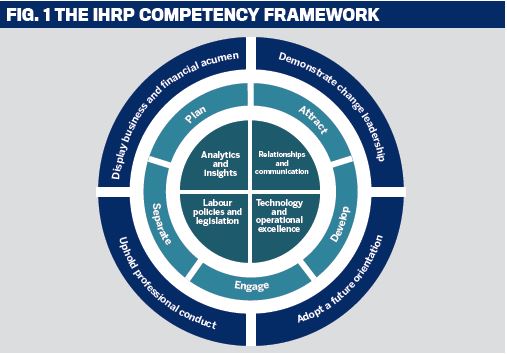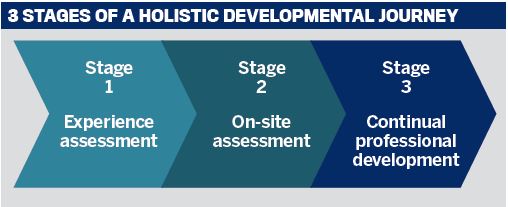HR jobs will not be spared from digital disruption and it’s time for HR professionals to get serious about staying relevant and upping their own skills. The IHRP Certification Framework provides the way forward
Those with a long career history in HR – or even those who are newer to the HR workforce but have a keen appreciation for how their profession has evolved over time – would acknowledge that it has transformed out of almost all recognition over the past 30 years.
In today’s increasingly complex and cost competitive environment, HR is expected to own business and people outcomes the same way a functional senior leader is held accountable for their respective KPIs in contribution to the business growth.
Is it any wonder that the skills of HR professionals have also had to adapt and evolve?
However, HR professionals and employers in Singapore – and indeed in most locations around the world – have to this point had an ad-hoc approach to acquiring and assessing relevant skills. This is about to change with the National HR Certification.
Taking the lead is the Institute for Human Resource Professionals (IHRP), the HR professional body set up by the tripartite partners: the Ministry of Manpower (MOM); the
National Trades Union Congress (NTUC); and
Singapore National Employers Federation (SNEF).
IHRP is the only HR professional body in Singapore authorised to implement the National HR Certification, which is known as the IHRP Certification. The IHRP is also playing a critical role in creating awareness, identifying relevant future-ready skills, aggregating demand for development, building a community of HR professionals to facilitate sharing and learning, creating platforms for ease of acquisition of the relevant skills, and encouraging continued learning and growth in the sector.
The IHRP Certification Framework
The IHRP Certification Framework aims to enhance the competencies of and create professional developmental pathways for HR professionals.
HR professionals of the future will need expertise in a wide range of areas, focused not only on developing human capital but on contributing to business success. The three areas of competency in the Certification Framework are designed to prepare HR professionals in these areas.
As illustrated in Fig. 1, the three areas of competency are:
- HR foundational competencies: these competencies underpin and serve as core enablers supporting HR functional activities. They include: analytics and insights; relationships and communication; technology and operational excellence; labour policies and legislation.
- HR functional competencies: these competencies are required for HR professionals to successfully deliver their functional role, which cover activities undertaken across the people management life cycle. These competencies include the ability to plan, attract, develop and engage talent, and to separate from that talent at the end of the employment relationship.
- HR mindsets and behaviours: these competencies reflect the way HR professionals think and behave as they approach their HR work, deal with people and manage work-related situations. They include: displaying business and financial acumen; demonstrating change leadership; adopting a future orientation; upholding professional conduct.
A holistic developmental journey
The IHRP Certification also offers three stages that encompass a holistic developmental journey:
Stage 1: Experience assessment
HR professionals select their certification level and complete an online submission to demonstrate their HR experience and competencies. They will need to submit information of their education, training and HR experience. If successful, they will be invited to participate in the on-site assessment.
Stage 2: On-site assessment
HR professionals will be assessed on their ability to apply the body of competencies. They will go through scenario-based questions on a computer to demonstrate the skills, mindsets and behaviours that are crucial to an effective and successful HR function.
Stage 3: Continuing professional development
Upon certification, HR professionals are encouraged to embark on their continuing professional development (CPD) journey. Their CPD hours, together with employer testimonial confirming their current role in HR and a declaration of compliance to the IHRP Code of Professional Conduct will be required for recertification at the end of three years.
Widespread support
Singapore is currently at a critical inflection point: the economy is growing and unemployment is low, but an ageing workforce and declining workforce numbers are placing unique pressure on employers. Re-energising the workforce and preparing them for the future is critical. For this reason, the government is pushing future skills in a major way, with HR being one of the 23 key focus sectors.
The IHRP Certification has gained support from highly experienced HR professionals. For example, Carmen Wee is a seasoned and passionate business leader providing human capital insight and counsel to business executives. Currently, she is the global vice president, human resources, for the software business at Schneider Electric.
Wee tells HRD that, due to the pace of business and the unique challenges facing people in global roles – including cultural, ethical and business considerations – keeping skills sharp is critical.
“The global role requires a different set of soft competencies like energy, leadership, authenticity, collaboration and superior communication skills, which frankly takes years to build and hone. But it is possible if one is humble to learn, calibrate and take feedback,” she says.
Wee encourages all HR professionals, especially those just starting on their HR careers, to step up to the plate and upskill themselves. “It is extremely important that HR professionals take responsibility for their own learning and development. Don’t just rely on the company to spoon-feed you. There needs to be the hunger to learn continuously and never take the attitude that one has arrived,” she says.
Wee is keeping abreast of new topics like neuroscience, robotics, AI, digitisation, “and most of my reading diet is not related to HR”, she says.
In July 2017, Wee was awarded one of three pioneer Master HR Professional certifications from the IHRP.
“I am delighted to endorse the IHRP Certification for HR professionals in Singapore,” Wee tells HRD. “It marks an important and critical milestone for the future of the industry. As a recently certified professional, I had the opportunity to self-reflect on my journey over the past two decades in my career. The process enabled me to think deeply and passionately on why I continue to be in this high-impact role and to play a small part in helping the profession going forward. Everyone in my team is joining this exciting journey.”
Meeting the needs of a new era
In order for Singapore to continue to prosper for the next 50 years, it won’t just be about innovative technology or products – it will be the combined efforts of harnessing the potential and talent of Singapore’s diverse workforce. HR will play a critical role in doing this – but the profession needs to be both business and tech savvy.
“We in HR will need to step up and play a role to accelerate this transformation,” Wee says. “Being certified proves in one way that we are eligible to provide sound advice to the enterprise on how to do this. What else can be more exciting than shaping Singapore for the future?”
For further information on the IHRP Certification visit http://ihrp.sg/certification/ certification-framework



